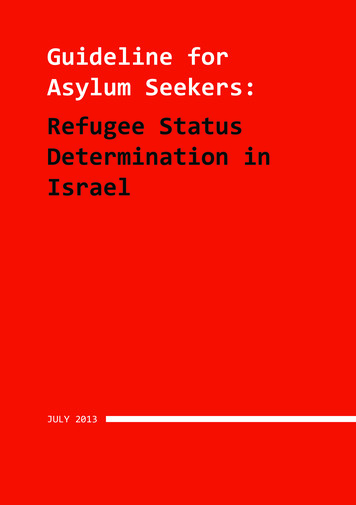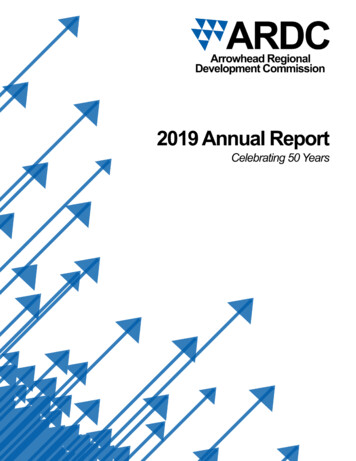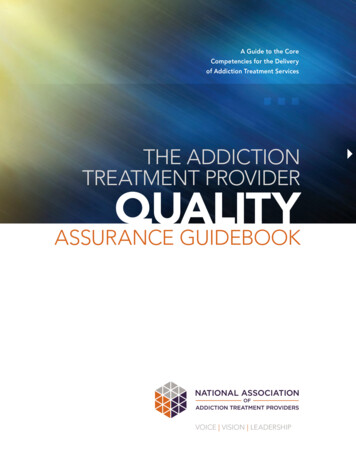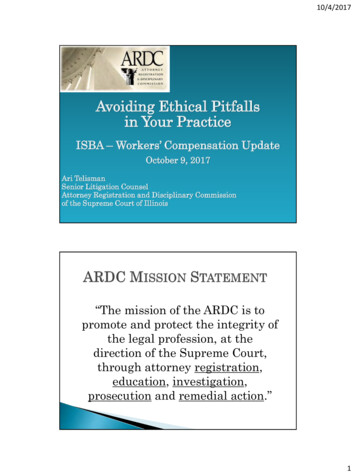
Transcription
Guideline forAsylum Seekers:Refugee StatusDetermination inIsraelJULY 2013
Guidelinefor AsylumSeekers:Refugee StatusDeterminationin IsraelFor more informationand advice on specificcases you can contactthe organizationsby phone or come induring our receptionhours.ARDC 03-6391416Sunday-Thursday15:00-18:00Hotline for MigrantWorkers 0–18:00Tuesday09:00–13:00Wednesday 14:00–18:00Thursday 09:00–13:00Section 1Who Is This For?This guideline is from theAfrican Refugee DevelopmentCenter (ARDC) and the Hotlinefor Migrant Workers (HMW).This guideline is helpful forany person currently in Israel,in prison or outside of prison,because of a fear of persecutionin his/her home country whowants to understand the Israeliasylum system.Asylum claims are processedin the same way for personsinside and outside of prison.For this reason, we will start bydescribing the general processand then provide some specificinformationfordetainees,including conditions for release.Our goal is to provide you withclear and accessible informationabout the Israeli asylum systemthat will allow you to know yourrights and duties during theprocess and to think about youroptions.We hope this information willassist you.
What is the Refugee Status Determination Process?Refugee Status Determination (RSD) is the process of inquiringas to whether you are eligible for protection under the 1951 UNRefugee Rights Convention. The Convention determines who isconsidered refugee and defines the obligations of host countriesto protect refugees.The convention is available online in: English, Arabic, French,Somali, and Spanish. You can find it and other relevant updateson the ARDC website under information for asylum seekers.When you start the RSD process, you are legally defined as anasylum seeker. If you manage to prove your claim, you should bedefined by the state as a refugee.Who is Eligible to Go Through the RSD Process? Any person who comes into the country (legally or illegally)is entitled to ask for asylum within a year of entering Israel(with some exceptions: read ‘Individual Refugee StatusDetermination Process’ for more details). Some countries (including Israel) choose to have a “temporarynon-removal policy” towards asylum seekers from a specificcountry/area. If you are eligible for this policy, you can stillapply for asylum, but, unlike other groups, you will not bedeported even if you don’t apply for asylum. At the moment,Sudanese [not from South Sudan], Eritrean, and Congoleseindividuals are under temporary non-removal, meaning Israelwill not deport citizens of those countries.What Does “Non-Removal Policy” Mean for You?If you are from Sudan, Eritrea, or DRC and you have a conditionalrelease visa [2A5], it is most likely that you are not registered asan asylum seeker but are under the non-removal policy.Recent changes in the law allow you to apply for asylum even ifyou are under group protection, which is a step that can protect
you in the future. Please read more about the process andcontact the ARDC for personal advice.Refugee Status Determination in IsraelWhile the convention is universal, every country interprets itdifferently: In Israel the asylum system is very difficult, and very fewindividuals are recognized as refugees (less than 0.2 %). Thispercentage is significantly lower than in any other Westerncountry. Currently, most asylum seekers in Israel don’t even go throughthe RSD process since they are under a non-removal policy(Sudanese and Eritreans).Section 2Individual Refugee Status Determination ProcessBased on the procedure in Israel, you have to file for asylumwithin a year of your arrival in Israel.If you don’t file a request within a year of your arrival in Israel,your claim will be rejected immediately unless there are specialreasons for the delay or new circumstance have arisen (a changein the political situation in your home country, for example).If you are planning to file a claim after more than a year, werecommend that you talk to the ARDC and receive personaladvice on whether you should contact a lawyer beforeapproaching the Ministry of the Interior.After filing a claim (“filing”, for non-detained individuals only,means that you have approached the Ministry of Interior andfilled out forms), you will be summoned to a Basic Interview. Tostart the application process, you have to approach the Ministryof Interior, RSD unit, 53 Salame St. Tel-Aviv.Basic Interview and Forms
FormsBefore the Ministry of Interior questions you, you will be askedto fill out papers with questions that will be asked again in theinterview. These forms are the basis for your claims, and theinformation that you give in them will be used in the future. As inevery interaction with the Ministry of Interior, it is important togive accurate and true answers in these forms. You will have towrite dates of major events in your life. It is important to writeexact dates or, if you are not sure about a date, write “I am notsure” or “I don’t remember exactly”. Changing a date at a latertime or forgetting it will cause problems as your credibility willbe questioned.The ARDC is able to assist with forms if you require help.Basic InterviewIn this interview, you will be questioned about your life in yourhome country.Example questions: Why did you come? Why did you leave? Where is your family? How did you arrive in Israel and why didn’t you stay in Egypt? What will happen to you if you are forced to go back?This interview has two main goals: The first goal is to find out whether your claims, assumingthat they are true and can be proven, give you the right forprotection under the 1951 UN Refugee Right Convention. The second goal is to determinate your identity – thatis, under which nationality your claim will be processed.Even though presentation of original documents is notmandatory, it is very helpful to do so for the identification
process. Documents that can be helpful include passports oridentity cards. It is against procedure to require you to doanything that puts you or your family members in danger.This includes any requirement for you to go to your embassy.Contact the ARDC if you were asked to do so.If documents have been sent to you by family members, be sureto leave the envelope SEALED until your appointment and havethe officer open the envelope in front of you. Forged documentscan be taken from you by the Ministry of Interior.Even though checking your credibility is not an official goal inthis interview, we remind you again that you are obligated totell the truth. If at any point you are not sure about an answer,it is better to say “I don’t know/ I don’t remember” than to giveinaccurate information. The answers you give in this interviewwill be reviewed in future assessments of your case andcompared to any other statements you made.At the end of every interview, you will have to sign a statementshowing that you understood the content of the interview. Ifyou recognized a problem in the translation during the interview,you should say something and have your statement added tothe transcript of the interview.Results of Basic InterviewThe goal of the Basic Interview is to determine whether thereasons that led you to flee your country are recognizedas reasons for receiving asylum under the Refugee RightsConvention.Assuming everything you said was true, if the Ministry of Interiorbelieves that you would still not qualify for protection under theConvention, then you will be rejected immediately. In that case,you can appeal the decision in court within 7 days from receivingthe rejection. If you choose not to appeal, you will be defined as
an “illegal” at the end of 7 days.Another reason for rejection can be that the Ministry doesnot accept your identity. For example, if you said you are fromEritrea, but you lived in Ethiopia for a long time, the ministrymight claim you are Ethiopian. In that case, you can either appealthe rejection in court or try to start the process as an Ethiopianwith Eritrean ethnicity. In this kind of situation, we encourageyou to contact the ARDC for advice.You should receive a copy of the decision and opinion as well asthe transcript of your interview. If you haven’t received thesedocuments, you can contact the ARDC for further assistance.As mentioned before, a rejection decision can be appealed incourt. If you are interested in approaching a lawyer, you cancontact the ARDC for recommendations.If you are not rejected, you will receive a 2A5 visa (known as“conditional”) that can be renewed at least until your nextinterview. Often the next interview will only be after a fewmonths.During InterviewsRights At any interview, you are entitled to be represented by alawyer who can observe the interview and add commentsin the end. (The ARDC and HMW can provide lawyerrecommendations). At any interview, you are entitled to a translator in the officiallanguage of your country. In rare cases, we see a situationwhere a person speaks fluently only a tribal language andnot his country’s official language. A recent court decisiondetermined that the Ministry of Interior is obligated toprovide a translator even in these situations. In case you (orsomeone you know who can’t read this guideline) didn’t
receive a translator to his native language, please contactthe ARDC\HMW for additional advice. You are entitled to ask for the interview to be conducted bya person of your same gender (by requesting either a man ora woman), and the Ministry of Interior has to do its best toprovide this. You are entitled to receive transcripts of your interviewsafter your claim was rejected.Duties It is your responsibility to cooperate with the Ministry ofInterior. For example, it is your duty to update your contactinformation with their office when this information changes(if they send you a letter or try to contact you on the phoneduring your process, and they are unable to reach you, theycan close your file). It is your responsibility to attend every interview/ meeting/visa renewal. Any action on your side that can show that youare not cooperating with the process can lead to closing ofyour file. During every interaction with the Ministry, your credibility istested. You HAVE TO TELL THE TRUTH and provide consistentanswers in every interview. It is also necessary to provide allrelevant information. If the Ministry of Interior believes orfinds out that you are hiding relevant information, they willsee this as lying.TipsWe recommend you always do the interview in a language thatyou speak fluently to avoid misunderstanding.If you received a transcript of your interview, we recommendyou read it with a Hebrew speaker to make sure there were nomistakes in translation.
Note that in every interview the interviewer will ask you thequestions that will allow you to tell your story in full. In the endof most interviews, you will be asked if there is anything youwould like to add. That is the time for you to add any detailsthat you didn’t get the opportunity to mention before. It is veryimportant to give a clear and accurate picture of your story andthe circumstances which led you to flee your country.We also strongly recommend that you write down everythingthat happened during the interview the moment you get out ofthe RSD unit. It is important that you have your on “protocol” ofwhat happened at the interview.Long InterviewsIn this interview, both your credibility and eligibility are inquestion.When you attend the interview, you are likely to be investigatedfor a long time. The officer won’t always be nice. They canaggressively ask you questions, and they can tell you that you’rea liar and generally have an aggressive attitude.If you feel that your dignity or rights were violated during thisprocess, please contact the ARDC for further consultation.We understand you are here for very serious reasons and havesuffered trauma, so if you need psychological assistance beforeor after an interview, please also contact the ARDC.ResultsThere are few possible results for the interview: Rejection - you might receive a rejection letter right after theinterview. You will be given 7 or 14 days to leave the countryand the option to appeal the rejection to the Ministry ofInterior (only in case you have new information) or the court(in any case). In both cases, you can come to the ARDC officewith the rejection letter for personal advice. In some cases
we would be able to help you with the appeal. No decision - if, at the end of the interview, you were given avisa and not a rejection letter, it means that at the momentyou were not rejected. You will keep taking visas from theMinistry until you have been contacted again. It is possiblethat you will be called for another interview. It can takemonths or a year in some cases, but it can also happen veryquickly over a few weeks. Approval - in rare cases, the Ministry of Interior approves arefugee claim. This decision will be made by a committee, andso you would not get the answer right after the interview. Itcan take months before the Ministry will make the decision.Until a final response, you will hold a 2A5 (“conditional”)visa.PrisonThe Prevention of Infiltration Law – General InformationAs of June 2012, asylum seekers in prison are held under thePrevention of Infiltration Law. The law’s object is to discourageindividuals from arriving in Israel. To that end, the law allows forlong periods of detention (as much as 3 years) until it becomespossible to deport the “infiltrator”. Having said that, the lawstates that, if an individual is eligible for status in Israel, thedeportation order will be revoked, and s/he will be releasedfrom detention. Once an individual has applied for status inIsrael (namely – refugee status), the law allows the state limitedperiods to process the application and to give the applicant adecision. In the case that three months have passed since submittingthe application, and the Ministry of Interior has not begunprocessing it (i.e. – conducted an interview), the law grantsthe tribunal judge in prison the mandate to release the
applicant. In the case that nine months have passed since submitting theapplication, and no decision has been given by the Ministryof Interior, the law grants the tribunal judge in prison themandate to release the applicant. In the case that three years have passed since the applicanthas been detained, the law grants the tribunal judge themandate to release the applicant.In addition to the grounds mentioned above, the law also allowsfour other exceptions to the general rule of detention: In the case that, due to an individual’s age or medicalcondition, keeping him/her in detention is likely to causedamage that is preventable only by means of release. In the case that special humanitarian grounds exist, otherthan those stated above. In the case of an unaccompanied minor. In the case that release from detention will assist in theindividual’s deportation proceedings.PLEASE NOTE! These grounds DO NOT constitute mandatoryrelease from detention. Release from detention under thesecircumstances is submitted to judiciary discretion. The ARDCcan provide lawyer recommendations to assist imprisonedindividuals.Applying for Asylum Within DetentionAs of today, in order to apply for asylum while in detention,you have to fill out the RSD forms, which are supposed to bedistributed by Ministry of Interior employees in the detentioncenters (for instruction regarding the content of the forms,see above). If you are unable to fill the forms in English, it is
advisable to ask for the assistance of other detainees, or Ministryof Interior representatives.Make sure to state that you filled the forms with the assistance ofan interpreter, and that the information you provided is subjectto obvious limitations. Once you have filled out the form, youneed to submit it into the hands of a person who works for theMinistry of Interior. Make sure you get a receipt that shows thatyou submitted the forms and includes the date and the name ofthe representative you handed the forms to.In addition to the forms, it is crucial that you continue to state,on every given opportunity, that you are an asylum seeker, thatyou fear going back to your country of origin, and that you seekthe protection of the state of Israel.What to do if You are Arrested for a CrimeAccording to the Prevention of Infiltration Law of 2012, thePopulation and Immigration Authority can detain an individualin the following cases: In the case that an individual was a suspect in committing anoffense, and the police intend to close the file, due to lack ofsufficient evidence, or lack of interest to the public. In the case that an individual stood trial and was found guilty,and has now finished serving his sentence.In both these cases, enforcing this regulation is possible whenthe criminal offenses, allegedly committed by the individual,pose a threat to national security or public safety. In addition,in each case, there must be a legal opinion stating that puttingthe individual in custody meets the criteria set by the regulation.When enforcing the regulation in the case of an individual whosecriminal case was closed, the evidence to the commission of theoffense held by the police must be clear and unequivocal.
If the state decides to implement the procedure in your case,you will have a hearing in front of a Population and ImmigrationAuthority representative, who will decide whether or not torevoke the temporary stay permit (2A5) and issue a deportationwarrant according to the Anti-Infiltration Law. In this case, youwill be transferred to one of the detention centers, where, if youwish, you will be able to apply for asylum.As you can see, the asylum process in Israel is very complex.One of the biggest challenges we face while trying to provideyou with accurate and reliable information is the fact that thelaws and policies are constantly changing. Once we print theinformation, we can’t keep updating it, and so we recommendchecking with us for any specific questions. These notes are meant to give you general ideathey are in no way a replacement for legal advice.
How Does the ProBasic InteRejected Out of HandSummaryAppeal to Court(with a Lawyer)Return to Your HomeCountryRejected
ocess Look Like?erviewReferred for FurtherInterviewLong Interviewy ProceduredDeliberation inCommiteeRejectedAppeal toMinistry ofInteriorApprovedReceive RefugeeStatus
This publication has been producedwith the assistance of the EuropeanUnion. The contents of thispublication are the sole responsibilityof the Hotline for Migrant Workersand the African Refugee DevelopmentCenter and can in no way be takento reflect the views of the EuropeanUnion.
ARDC 03-6391416 Sunday-Thursday 15:00-18:00 Hotline for Migrant Workers 03-5602530 Sunday 09:00-12:00 13:00-17:00 . African Refugee Development Center (ARDC) and the Hotline for Migrant Workers (HMW). This guideline is helpful for any person currently in Israel, in prison or outside of prison, because of a fear of persecution in his/her .










